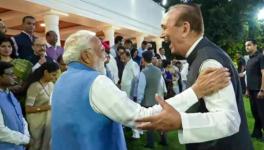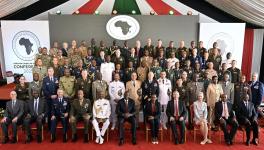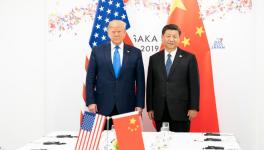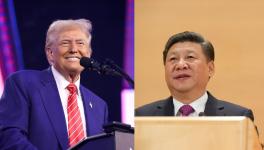Trade: On to Bali, ' To Buy a Pig in a Poke?'
Geneva, 21 Nov - An ancient Indian saying (perhaps by a disillusioned courtier) has this: 'the words of a king, are like words writ in water, disappearing in the next ripple of waves.'
As developing countries -- working against time and around the clock, and involved in some confusing negotiations, on call for green rooms' (even without specifying agendas), and even more limited consultations -- in attempts to produce a "Bali package of deliverables", they and their capitals should remind themselves of this saying, lest they commit the same mistakes they did in the run-up to Marrakech (November-December 1993, February-March 1994), and thereafter, and some of the Ministerial Conferences since then.
At Marrakech, they need to remind themselves, in an effort to conclude the Uruguay Round (UR), and convert a provisional GATT treaty (without a legal institutional personality) into a definitive Treaty-based Organisation (â rules-based' as everyone claimed, singing from the same music score at Marrakech and thereafter), they paid an advance price in the form of agreeing to undertake new obligations (TRIMS, TRIPS, several UR agreements, GATS) believing in some dubiously worded commitments of advanced countries that they would implement over time their commitments on agriculture reform and other trade agreements.
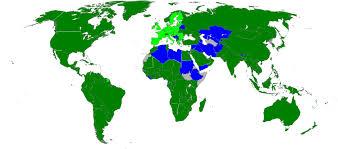
Image Courtesy: commons.wikimedia.org
Even before Marrakech, in February-March 1994, during the legal scrutiny stage of the UR agreements (most of them negotiated separately, using variations of language on same issues, without knowing how they would all be put together at the end into what became the WTO), they decided not to reopen any text (in any agreement) to ensure consistency of formulations across the agreements. This they did, lest they unravel the whole package (a Canadian argument at that stage). They bought into this argument of Canada that all these doubts could be left to the dispute settlement process (involving adoption of rulings by negative consensus) to resolve and reconcile the problems.
Though the WTO treaty makes clear that any issues of interpretation is the sole prerogative of the Ministerial Conference (or the General Council acting for the MC in between), the Dispute Settlement Understanding (DSU) panels and Appellate Body (AB), have under the guise of â clarification' of rights and obligations, misused the negative consensus process to rewrite the rights and obligations by interpreting the treaty.
At Doha, meeting in the wake of 9/11, developing countries agreed on a reform package, including negotiations for rules to set right the inequities of the system, and a range of negotiating issues to be negotiated and agreements reached and implemented as a Single Undertaking.
In both instances, they bought a â pig in the poke', and they are now on the cusp of repeating the same story for a third time.
The possibility of concluding the Doha Single Undertaking, with benefits to themselves, was allowed to lapse, when then WTO D-G and Trade Negotiations Committee (TNC) Chair, Mr. Pascal Lamy, in 2006, on the eve of US Congressional mid-term elections (at a small informal meeting he convened outside Geneva of a small key group of countries), suspended indefinitely the Doha talks. He did so to save the US any embarrassment on Cotton and other key agriculture issues at the November 2006 mid-term congressional elections.
The power to suspend or adjourn the talks is vested with the General Council (in between ministerial conferences), and not even with the TNC, leave aside its chair. Nevertheless, Mr Lamy did so and announced it to assembled newsmen there and, only after the WTO media office was queried (by this writer) on what authority given to Lamy this had been done, he called an informal TNC in Geneva, announced it there, and had the TNC to endorse it.
Informal TNCs keep no records, and hence we don't know what view the delegations there took. The GC, which keeps records, subsequently merely took note (meaning it did not approve or disapprove!). So much for the â rules-based' system and its rulelessness.
With the Republican Bush administration losing its majority in the US House in November 2006, and soon thereafter its fast-track authority, Lamy's "window of opportunity" for concluding the Doha negotiations was closed.
In all the subsequent efforts at the WTO, and deadlocks since then, thanks mainly to the backtracking on agriculture commitments by the US and EU, the Doha negotiations have been run to the ground, hopelessly deadlocked, and needing a new look and new hand to its resuscitation and successful conclusion as a Single Undertaking. (The US and EU since then are trying to find a way of closing the DR, by blaming the developing world, and forget their commitments at Marrakech 1994, and Doha 2001, and move on to make further inroads into the national space of developing countries.)
In all this time, the developing countries have allowed the US and EU, with considerable help from the WTO leadership and secretariat, to rewrite the narrative, to convert the Doha Round, its aims, objectives and agenda, into one for the developing countries to open up their markets to unreasonable neo-mercantilist demands of the US and EU corporations.
With a new Director-General from a developing country, Mr. Roberto Azevedo from Brazil, and a Ministerial Conference in a key developing country, Indonesia, which is due to hold Presidential and Parliamentary elections early next year, and thus a stake in having a successful Ministerial, developing countries face some dilemmas.
They have also allowed themselves, without public challenge, to be victims of a new narration about the WTO, namely its inability to function as a forum for multilateral trade negotiations (obligatory in terms of accords already in its annexes, and enabling one on new trade issues - vide Art III of WTO) to negotiate on multilateral issues and reach agreement, has reduced its credibility and that all this is the fault of the majority of the developing countries, in particular the major ones.
In this context, they are being asked to agree on a Bali deliverable:
-- a definitive agreement on Trade Facilitation (TF) with some commitments and dispute settlement process to call them to account.
-- some dubious concessions for the developing countries in return: a so-called 4-year peace clause (with no assurance of peace or continuance of peace till a permanent solution is found) on public stockholding for food security in developing countries; a â best possible endeavour' effort to limit and phase-out agriculture subsidies (the language used is worse than the â best endeavour' commitments of the Part IV - development issues - of GATT 1947 that remain till this date as paper promises; plus some efforts at an agreement on Tariff Rate Quota issues in Agriculture (tabled much before by Azevedo as Brazil's WTO envoy, as a deliverable for Bali), and some moves on LDC issues (with many qualifications and ifs and buts).
The TF draft as has evolved so far (to be finalised over the next 24-48 hours) is so riddled with contradictory language for a definitive agreement that it is now envisaged that Bali will take "a political decision" on it, asking the General Council to clean up and complete the process (the various provisions of the TF Agreement envisaged really amount to amendments of GATT 1994, the WTO treaty itself, for incorporating TF Agreement as a part of the annexed treaties, and do all this without the amendment processes specified), and adopt a protocol that countries would be asked (demanded may be a better language) to accept, under pain of otherwise being drummed out of the WTO.
Developing country members are being told that the US and EU have lost confidence in the WTO system and its remit as a negotiating forum, and it is for them to act to win back US and EU confidence. This is a narrative that also appears to have been bought into by the WTO leadership or at least parts of it, and among some elites in developing countries too.
Perhaps the US and EU should be asked to revisit the recent past, and remind themselves of the similar stance of the leaders of the then German Democratic Republic during the 1953 uprising (see https://en.wikipedia.org/wiki/Uprising_of_1953_in_East_Germany) and the sarcastic comments at that time (see https://en.wikipedia.org/wiki/Bertolt_Brecht) by Bertolt Brecht, German poet, playwright, theatre director, and Marxist, in one of the poems in the Elegies, "Die Losung" (The Solution).
A Norwegian communication before the TF Negotiating Group sets out its ideas and views on how various unfinished work in completing a draft TF Agreement (and the amendments the TF Agreement wants to bring about in GATT 1994 and the WTO's Agreements in Annex 1A can be achieved without going through the amendment process). This, Norway suggests, should be done through a protocol to be drawn up by the General Council, which after Bali will clean up the TF Agreement, agreed as a â political decision', and draw up a protocol. And like Ulbricht in the GDR, such a protocol will ask WTO members to accept it (and win back confidence of US and EU!) or enable them to act ala Brecht's suggestion to the GDR leaders of his day (see citation above)!
And in its communication, Norway says it is based on the model of the TRIPS amendment to give effect to the Doha Public Health Declaration, to provide for an effective Final Date for TF Agreement to be accepted and enter into force, and for â inviting' those Members not doing so to withdraw from the WTO.
On the public health and TRIPS amendment, a simple reference by Norway to the WTO website would have shown that the WTO gave a waiver from TRIPS obligations on this issue to Members, and agreed on a TRIPS amendment in 2003, with a 1 Dec 2007 date set for acceptance and entry into force; and since then the WTO has repeatedly extended the date, combining it with a permanent waiver for Members until they are able to accept it, and for entry into force when two-thirds of members have accepted and deposited it etc etc. That amendment has as of now gained acceptance of 48 of the WTO members, far below the two-thirds membership acceptance needed. (http://www.wto.org/english/tratop_e/trips_e/amendment_e.htm)
In 1953, Ulbricht and the Soviets found, they had to erect a wall to keep people in (rather than adopt Brecht's sarcastic suggestion in the Elegies (for the GDR leaders to get new people that have confidence of the leaders!).
If the US, EU and WTO move forward now on a course suggested by Norway, they may find that rather than inviting Members not accepting a TF Agreement to withdraw, they may have to erect a WTO wall to prevent developing countries, unable to get equity and justice, to find a way out, with their own alternatives to iniquitous and unjust rules of the WTO.
The US and Europe may have horrendous military power, but otherwise they are no longer in a power position in the world to dictate and prevail, provided leaders of developing countries realise this.
The US and EU (despite their threats of bilaterals and plurilaterals) need the WTO multilateral system as much, if not more than other members of the international community.
*Chakravarthi Raghavan, former Editor-in-Chief of Press Trust of India (PTI), is the Editor Emeritus of the SUNS.
Disclaimer: The views expressed here are the author's personal views, and do not necessarily represent the views of Newsclick
Get the latest reports & analysis with people's perspective on Protests, movements & deep analytical videos, discussions of the current affairs in your Telegram app. Subscribe to NewsClick's Telegram channel & get Real-Time updates on stories, as they get published on our website.











